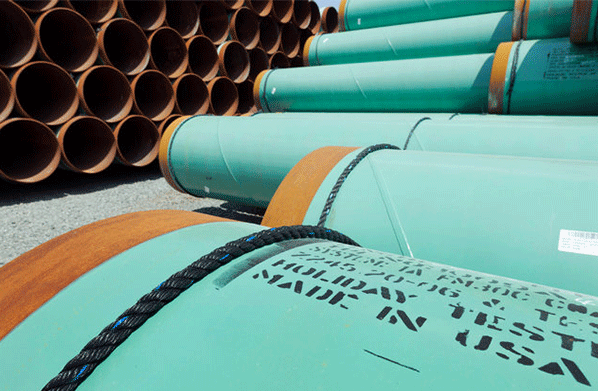As expected, President Obama has nixed the construction of the Keystone XL pipeline.
The Wall Street Journal reports:
The Obama administration rejected the Keystone XL pipeline Friday, capping a politically charged review of the oil project that lasted more than seven years and escalated into a broader debate on energy, climate change and the economy.
“The State Department has decided that the Keystone XL Pipeline would not serve the national interest of the U.S.,” President Barack Obama said in brief remarks from the White House. “I agree with that decision.”
Mr. Obama cited the urgency of climate change, and the need for American leadership on that problem, as key reasons for his decision.
Mr. Obama, who has made environmental issues a centerpiece of his second term, had signaled deep misgivings about the pipeline project as he pursued an expansive agenda aimed at fighting climate change.
The president said Friday that the pipeline had occupied an overinflated role in political discourse, adding that it was neither a silver bullet for the economy nor an express lane to climate disaster. The project would not have lowered gas prices, improved energy security or made a long-term contribution to the economy, Mr. Obama said.
The response from GOP leaders was immediate:
House Speaker Paul Ryan (R-Wisc.) conndemned Obama’s decision. “This decision isn’t surprising, but it is sickening,” Ryan said. “By rejecting this pipeline, the president is rejecting tens of thousands of good-paying jobs. He is rejecting our largest trading partner and energy supplier. He is rejecting the will of the American people and a bipartisan majority of the Congress.”
The CEO of TransCanada, the company that was developing the pipeline, said that in rejecting the pipeline, the president opted for "misplaced symbolism … over merit and science – rhetoric won out over reason."
It has been a long and dishonest review, with President Obama repeatedly sending the project back to the State Department for further review, even though, until now, reviews repeatedly have found that the environment impact would be small.
Even so, environmentalists made defeating the pipeline a main thrust of their movement, and their concerns are what prevailed. In rejecting the pipeline, Secretary of State John Kerry said:
. . . while [the pipeline] would facilitate the transportation to the United States of one of the dirtiest sources of fuel on the planet, the proposed project by itself is unlikely to significantly impact the level of crude extraction or the continued demand for heavy crude oil at refineries in the United States.
The reality is that this decision could not be made solely on the numbers – jobs that would be created, dirty fuel that would be transported here, or carbon pollution that would ultimately be unleashed.
Look for this as the prelude to similar symbolism from the Obama administration later this month after the world's climate change leaders fire up their jets to gather in Paris for the climate change conference there.


